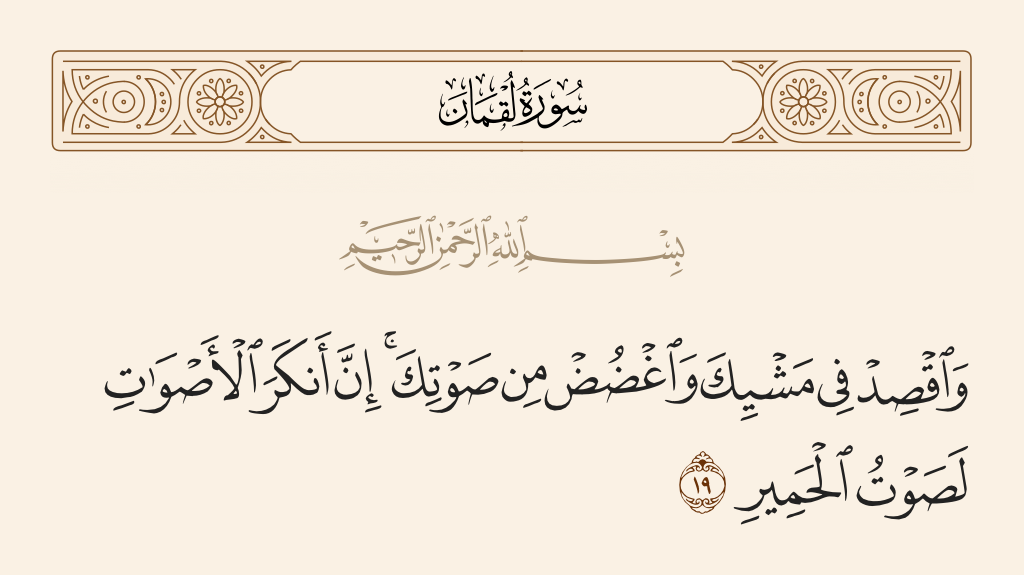Surat Luqman Verse No. 19: Reading and listening
Translation of the verse 19 from Surah Luqman : Number of verses 34 - - page 412 - Part 21.

﴾وَٱقۡصِدۡ فِي مَشۡيِكَ وَٱغۡضُضۡ مِن صَوۡتِكَۚ إِنَّ أَنكَرَ ٱلۡأَصۡوَٰتِ لَصَوۡتُ ٱلۡحَمِيرِ ﴿
[ لقمان: 19]
"And be moderate (or show no insolence) in your walking, and lower your voice. Verily, the harshest of all voices is the voice (braying) of the ass."
English - Sahih International
And be moderate in your pace and lower your voice; indeed, the most disagreeable of sounds is the voice of donkeys."
Tafheem-ul-Quran by Syed Abu-al-A'la Maududi
(31:19) Be moderate in your stride *33 and lower your voice. Verily the most disgusting of all voices is the braying of the donkey.' *34
Tafheem-ul-Quran by Syed Abu-al-A'la Maududi
*33) According to some commentators it means this: 'Walk neither fast nor slow but at a moderate pace :" but the context shows that here the pace or the rate of walking is not the question. There is nothing morally wrong with a fast or a slow pace in itself, nor can there be a rule made for it. When a man is in a hurry. he has to walk fast, and there is nothing wrong if one walks slow when walking for pleasure. Even if there is a standard for the moderate pace, it cannot be made a law for every person at aII times. What is actually meant by this is to reform the state of the self under which a person walks haughtily. The haughtiness and arrogance of a person inevitably manifests itself in his gait and style of walking, which shows the state of his mind and also the cause of his pride and haughtiness. Wealth, authority, beauty. knowledge, power and such other things cause a man to became proud and vain, and each of these gives him a special style of gait. Contrary to this, manifestation of humility in the gait is also the result of one or the other morbid mental state. Sometimes the hidden conceit of the self of a man takes on the form of ostentatious humility, piety and godliness and this is shown by his gait; and sometimes man really feels so embittered by the frustrations of the world that he adopts a sick man's gait. What Luqman means to say is this: "Avoid these states of the mind and self and walk the gait of a simple, honest and noble person, which neither shows any vanity and haughtiness nor weakness nor ostentatious piety and humility."
The taste of the Holy Prophet's great Companions in this regard can be judged from a few instances. When Hadrat Umar once saw a man walking with his head hung down, he shouted out to him, saying, "walk with your head raised up. Islam is not sick. "He saw another person walking like a weak, sick man, and said, wretch! Do not sully our religion! " Both these incidents show that in the sight of Hadrat 'Umar religious piety did not at aII require that one should walk cautiously. like the sick man and show undue humility by one's gait. Whenever he saw a Muslim walking such a gait, he would have the apprehension that it would misrepresent Islam and would depress the other Muslims. A similar incident was once met with by Hadrat 'A'ishah. She saw a person walking as if run down and exhausted. She asked what was the matter. It was said, 'He is one of the reciters of the Qur'an (i e a person who remains engaged in reciting and teaching the Qur'an and in worship)." At this she said, 'Umar was the chief of the reciters of the Qur'an, but as it was he would walk with a firm foot, and he would speak with force and strength, and he would give a good beating if he had to." (For further explanation. see E.N. 43 of Bani Isra'il and E.N. 79 of AI-Furqan).
*34) This does not mean that one should always speak in a low voice and should never raise one's voice. By citing the braying of the asses, it has been clearly indicated what son of the tone and voice in speech is meant to be discouraged. One kind of lowness and loudness'roughness and softness, of the rove and voice is that which is needed under natural and genuine requirements. For example, when speaking to a man close at hand, or to a small group of the people, one would speak in a low voice, and when speaking to a man at a distance or to a large number of the people, one would inevitably have to speak loudly. Similar is inevitably the difference in tones depending on the occasion and situation. The tone of praise has to be different from the tone of condemnation. and of the expression of goodwill from that of indignation. This thing is in no way objectionable. Nor does the admonition of Luqman imply that one should always speak in a soft and low voice and tone regardless of the occasion and requirement. What is objectionable is that one should shout oneself hoarse and produce a voice like the ass's braying in order to bully and debase and browbeat the other person.